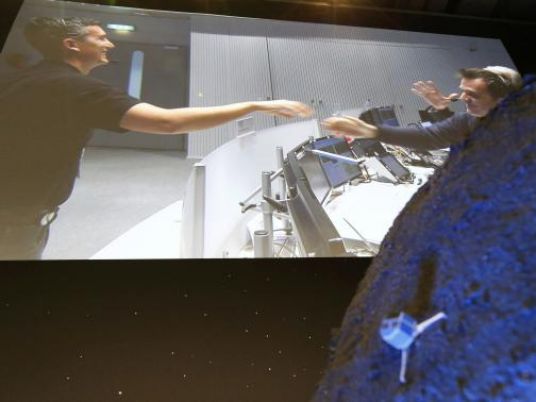
Data from the European Space Agency's Rosetta space craft shows that water on Earth likely came from asteroids hitting the planet billions of years ago rather than from comets as previously believed, researchers said Wednesday.
Water on Earth is more likely to have come from asteroids that hit our planet billions of years ago than comets, European researchers said on Wednesday.
Mankind's first-ever probe of a comet came last month when the European Space Agency's Philae lander touched down on the duck-shaped 67P/Churyumov-Gerasimenko comet, but the latest report in the journal Science comes from an instrument aboard the Rosetta spacecraft that has been studying the comet's interior since August.
"We have to conclude… the terrestrial water was brought by asteroids more likely than comets," said Kathrin Altwegg, principal investigator on the ROSINA mass spectrometer that has been examining the chemical fingerprint of water and other gases in the comet.
The report in the peer-reviewed US journal is based on the atomic signature of water molecules from the comet, showing that they are vastly different from water on Earth.
Scientists measure the ratio between deuterium, a hydrogen isotope, and hydrogen, which forms water when combined with oxygen.
The comet has shown "probably the highest level of deuterium to hydrogen ratio, the most heavy of any of the solar system's bodies," said Altwegg, a professor at the University of Bern in Switzerland.
The ratio is between 30 and 120 percent higher than that formed in water molecules found in Halley's comet, which belongs to the same comet family, Jupiter, formed in the Kuiper Belt.
Such a high ratio of deuterium to hydrogen "probably means that it was formed at very low temperatures and that it could be… most probably the original material from the very, very early time of our solar system, so it's a real treasure chest to explore how our solar system looks like 4.6 billion years ago," she said.
On the other hand, water in asteroids has a lower deuterium/hydrogen ratio and is more similar to water on Earth.
Comets are rich in water, which is not the case for asteroids — some of which have none, said Francis Rocard, a Rosetta scientist at the France's National Center for Space Studies (CNES).
Also, many more asteroids have been found to date(650,000) than comets (4,000), he told AFP.
"To me, these findings do not shake things up but render them a bit more complex than we previously believed, all while reinforcing the hypothesis that asteroids are the source of Earth's water," he told AFP.
"The ratio of deuterium to hydrogen in water is variable from one comet to another, much more so it appears than in asteroids and for the moment we are not sure why."
Comets are the most primitive objects in the solar system and are rich in carbon, and by smashing into the Earth scientists say they may have brought elements that allowed life to exist.
The Rosetta mission, approved in 1993, aims at exploring the composition of comets, believed to be primordial clusters of ice and dust left from the building of the solar system 4.6 billion years ago.
